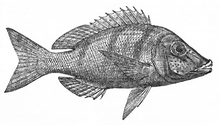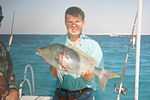Lethrinus nebulosus
| Lethrinus nebulosus | |
|---|---|
| | |
| A Lethrinus nebulosus specimen collected off Ilot Signal (off Nouméa), New Caledonia in 2006. It has an overall fork length of 42.2 cm, and weighs 1,400 g. Note that this fish has been speared. | |
| Scientific classification | |
| Kingdom: | Animalia |
| Phylum: | Chordata |
| Class: | Actinopterygii |
| Order: | Perciformes |
| Family: | Lethrinidae |
| Genus: | Lethrinus |
| Species: | L. nebulosus |
| Binomial name | |
| Lethrinus nebulosus (Forsskål, 1775) [1] | |
| Synonyms | |
|
See text | |
Lethrinus nebulosus is a species of emperor fish.[1] Common names include spangled emperor, green snapper, morwong, north-west snapper, sand bream, sand snapper, sixteen-pounder, and yellow sweetlip.
Description

This species is commonly found at approximately 87 cm in length, but grows to 70 cm.[clarification needed] It is yellow to yellowish-brown or bronze in colour, the belly being lighter. It has scattered blue markings over the body. The cheeks have no scales and may have a vertical blue markings.[2] It has whitish or yellowish fins with a yellowish-edged dorsal fin.
Distribution
This fish occurs in the waters of East Africa to the southern parts of Japan. It also lives in Australian coastal waters, and has been recorded in the Red Sea, Persian Gulf[3] and New Caledonia,[4][5] where it is one of the major commercial fish.[4]
Habitat
Lethrinus nebulosus inhabits both marine and brackish waters at depths of between 10 and 75 metres.[3] It is a non-migratory species,[3] and is found on coral and rocky reefs, seagrass beds, mangrove swamps, as well as over sandy substrates.[2] Juveniles may be found in large schools.
Diet
This species feeds mainly on mollusks, echinoderms, and crustaceans. It also eats polychaetes and other fish, but less commonly.
As food

Lethrinus nebulosus is sought after by recreational fishers and is considered to be delicious.[4][6]
Parasites
As most fish, Lethrinus nebulosus is the host of many species of parasites.[7] Monogeneans parasitic on the gills include the diplectanids Calydiscoides difficilis, Calydiscoides duplicostatus and Calydiscoides terpsichore,[8] an ancyrocephalid,[7] and an unidentified polyopisthocotylean.[7] The pharyngeal teeth harbour a species of the capsalid monogenean Encotyllabe[7] which is specialised to this special habitat. Copepods parasitic on the gills include three species of the hatschekiid Hatschekia including Hatschekia gracilis.[7] The digestive tract harbours the opecoelid Macvicaria macassarensis[7] and the zoogonid Diphterostomum tropicum.[9] In New Caledonia, where its parasites were studied, Lethrinus nebulosus has a total of eleven species of parasites.[7]
Synonyms
- Lethrinus alboguttatus Valenciennes, 1830
- Lethrinus anatarius Richardson, 1845
- Lethrinus aurolineatus MacLeay, 1882
- Lethrinus carinatus Weber, 1913
- Lethrinus centurio Valenciennes, 1830
- Lethrinus choerorynchus Bloch & Schneider, 1801)
- Lethrinus cyanoxanthus Richardson, 1843
- Lethrinus devisianus Whitley, 1929
- Lethrinus erythrurus Valenciennes, 1830
- Lethrinus esculentus Valenciennes, 1830
- Lethrinus fasciatus Valenciennes, 1830
- Lethrinus fraenatus Valenciennes, 1830
- Lethrinus frenatus Valenciennes, 1830
- Lethrinus gothofredi Valenciennes, 1830
- Lethrinus guentheri Bleeker, 1873
- Lethrinus karwa Valenciennes, 1830
- Lethrinus korely Valenciennes, 1830
- Lethrinus maculatus Valenciennes, 1830
- Lethrinus perselectus Whitley, 1933
- Lethrinus scoparius Gilchrist & Thompson, 1908
- Sciaena nebulosa Forsskål, 1775
- Sparus choerorynchus Bloch & Schneider, 1801
References
| Wikimedia Commons has media related to Lethrinus nebulosus. |
- ↑ 1.0 1.1 "WoRMS - World Register of Marine Species - Lethrinus nebulosus (Forsskål, 1775)". Marinespecies.org. Retrieved 2014-05-26.
- ↑ 2.0 2.1 "Spangled Emperor Lethrinus nebulosus". Retrieved May 26, 2014.
- ↑ 3.0 3.1 3.2 http://www.fishbase.org/summary/1846
- ↑ 4.0 4.1 4.2 Laboute, P. & Grandperrin, R. (2000). Poissons de Nouvelle-Calédonie. Nouméa, New Caledonia: Éditions Catherine Ledru.
- ↑ Fricke, R., Kulbicki, M. & Wantiez, L. 2011: Checklist of the fishes of New Caledonia, and their distribution in the Southwest Pacific Ocean (Pisces). Stuttgarter Beitraege zur Naturkunde Serie A (Biologie), 4, 341–463.
- ↑ "Spangled Emperor Recreational Fishing". fish.wa.gov. Retrieved May 26, 2014.
- ↑ 7.0 7.1 7.2 7.3 7.4 7.5 7.6 Justine, J.-L., Beveridge, I., Boxshall, G. A., Bray, R. A., Moravec, F. & Whittington, I. D. 2010: An annotated list of fish parasites (Copepoda, Monogenea, Digenea, Cestoda and Nematoda) collected from Emperors and Emperor Bream (Lethrinidae) in New Caledonia further highlights parasite biodiversity estimates on coral reef fish. Zootaxa, 2691, 1-40. Open-Access PDF
- ↑ Rascalou, G. & Justine, J.-L. 2007: Three species of Calydiscoides (Monogenea: Diplectanidae) from five Lethrinus spp. (Lethrinidae: Perciformes) off New Caledonia, with a description of Calydiscoides terpsichore sp. n. Folia Parasitologica, 54, 191-202.doi:10.14411/fp.2007.026
- ↑ Bray, RA.; Justine, J-L. (2014). "A review of the Zoogonidae (Digenea: Microphalloidea) from fishes of the waters around New Caledonia, with the description of Overstreetia cribbi n. sp.". PeerJ 2: e292. doi:10.7717/peerj.292. PMC 3961169. PMID 24688868.